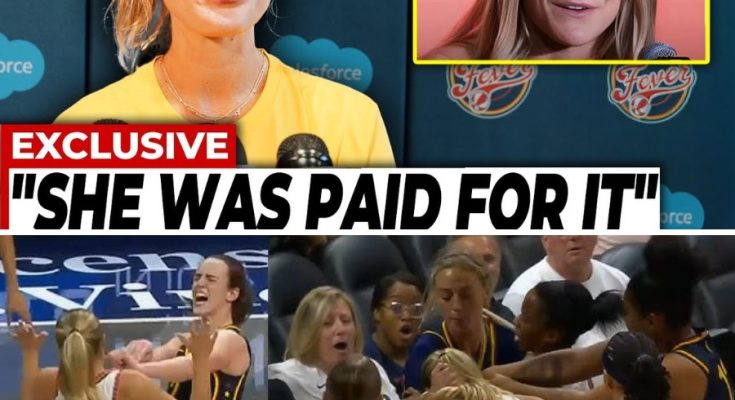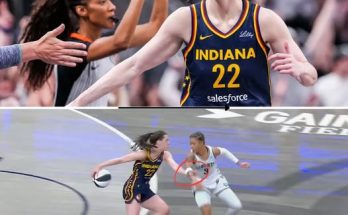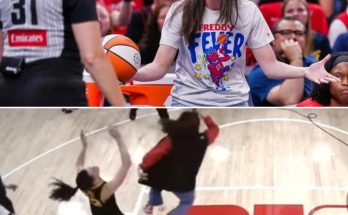
The WNBA has never shied away from drama, but the latest sequence of events has left fans, players, and analysts talking nonstop. Phoenix Mercury guard Sophie Cunningham, known for her fiery competitiveness and no-holds-barred approach on the court, recently faced off against Indiana Fever’s Jacy Sheldon in a matchup that carried more weight than the scoreboard alone. This confrontation came on the heels of a highly publicized incident involving Indiana Fever superstar Caitlin Clark, an event that already had the league buzzing with tension, speculation, and heated debate.
Cunningham’s performance in the game was electric. She dominated offensively, defended relentlessly, and made a series of plays that visibly frustrated Sheldon. Yet it wasn’t just her performance that drew attention; Cunningham’s pointed gestures, audible reactions, and strategic physicality seemed calculated to send a message—not just to Sheldon, but to the league as a whole.
The Caitlin Clark incident that set the stage
The context of this showdown is critical. Just days prior, Caitlin Clark had publicly revealed alleged targeting tactics in the WNBA, claiming that certain players were subjected to calculated physical pressure and inconsistent officiating. The revelations caused a stir, drawing widespread media attention and fan scrutiny. Analysts debated the veracity of Clark’s claims, while players weighed in with a mix of support and caution.
Cunningham’s recent clash with Sheldon is widely interpreted as an extension of the tension that followed Clark’s comments. Many observers see Cunningham’s dominance as a statement of support for Clark’s assertions while simultaneously asserting her own authority on the court.
The game that captured national attention
The matchup between Cunningham and Sheldon quickly became the narrative of the night. From the opening tip, Cunningham displayed a level of intensity that set the tone for the entire game. She drove aggressively to the basket, contested every possession, and maintained a relentless defensive presence. Sheldon, a talented guard known for her agility and scoring ability, found herself repeatedly blocked, pressured, and outmaneuvered by Cunningham’s veteran savvy.
Multiple observers noted Cunningham’s gestures and vocal commands to teammates, interpreted as both motivation and a warning to Sheldon. On several occasions, Cunningham gestured toward the bench, shouted instructions, and pointed directly at Sheldon after key defensive stops, creating a visible psychological impact on her opponent.
Fan and media reaction
As expected, the game sparked immediate debate on social media and sports networks. Clips of Cunningham’s domination over Sheldon went viral, accompanied by commentary ranging from admiration to criticism.
Some fans praised Cunningham for her skill and assertiveness. “That’s how you handle a young star,” one fan wrote. “Cunningham showed Sheldon exactly what veteran experience looks like.” Others questioned the intensity of Cunningham’s approach, arguing that while competitive, her gestures and verbal reactions bordered on excessive.
Media analysts dissected the matchup play by play. ESPN commentator Kara Lawson noted, “Cunningham’s performance was textbook veteran dominance. She exploited every opportunity and used her physicality and court IQ to control the game. Sheldon is talented, but she’s still learning the nuances of handling pressure from experienced players.”
Player perspectives
Inside the league, Cunningham’s approach has been met with mixed reactions. Veteran players praised her for demonstrating leadership and using her platform to assert authority, while younger players expressed both respect and concern about the intensity displayed.
Sheldon herself remained composed in post-game interviews, acknowledging Cunningham’s skill and presence. “Sophie played great tonight,” she said. “She’s a veteran for a reason. I’ll learn from it and come back stronger.” Her response, while measured, highlighted the psychological impact Cunningham had throughout the game.
Cunningham, for her part, remained unapologetic. “I play hard. I play smart. If someone feels that intensity, that’s part of the game,” she told reporters. “It’s about sending a message without breaking the rules, and I did exactly that tonight.”
The broader implications for WNBA rivalries
The Cunningham-Sheldon showdown, coming directly after the Clark controversy, has broader implications for league dynamics. Veteran players are increasingly asserting themselves against rising talent, emphasizing both skill and psychological dominance as key components of competition.
Analysts note that these high-profile confrontations may influence the next generation of players, who must learn not only technical skills but also how to handle pressure, intimidation, and media scrutiny. In this sense, Cunningham’s actions are part of a broader narrative in women’s professional basketball—one in which experience, strategy, and presence are as important as scoring points.
League response and officiating
The WNBA has not indicated any formal disciplinary action against Cunningham. League officials have praised both teams for maintaining sportsmanship while acknowledging the intensity and competitiveness displayed. However, the incident has reignited discussions about officiating standards and the management of physicality in women’s professional basketball.
Some commentators argue that as veteran players assert dominance, referees must remain vigilant to ensure that aggressive tactics do not cross the line into unsafe play. Cunningham’s strategic physicality, while within the rules, highlights the fine line between controlled aggression and potential infractions.
Psychological impact on players
Sports psychologists emphasize that high-intensity confrontations like Cunningham vs. Sheldon can have lasting effects on younger athletes. Dr. Erica Langley, a specialist in athlete performance, explains, “Experiencing controlled dominance from a veteran player can be both educational and challenging. It teaches young athletes how to handle pressure, but it can also test mental resilience and emotional regulation. Players who learn from these encounters often emerge stronger and more capable under stress.”
Social media amplification
As with many high-profile WNBA moments, social media has amplified the incident exponentially. Fans, sports influencers, and analysts dissected every play, gesture, and reaction. The viral nature of the clips ensured that Cunningham’s dominance reached audiences far beyond the game’s live viewers, sparking national conversation about player dynamics, competition, and respect in women’s basketball.
Lessons in leadership and competition
Cunningham’s performance is being cited as a textbook example of veteran leadership in action. By asserting control on the court and setting the tone for her team, she demonstrated that experience and strategic thinking are crucial assets in professional sports. Her ability to dominate both physically and psychologically underscores the importance of preparation, confidence, and presence in high-stakes competition.
Potential long-term effects on the league
This showdown, coupled with the lingering Caitlin Clark controversy, may influence WNBA culture in several ways. First, it reinforces the importance of psychological resilience and strategic thinking for younger players. Second, it highlights the power dynamics between veterans and emerging stars, which may shape how teams approach matchups and coaching strategies. Third, it draws attention to officiating and league policies, prompting discussions about ensuring fairness while maintaining competitive intensity.
League executives and coaches alike will likely review these incidents carefully, recognizing their potential impact on player development, fan engagement, and media narratives. The Cunningham-Sheldon matchup may serve as a case study for future training programs and coaching strategies.
Conclusion
Sophie Cunningham’s dominant performance against Jacy Sheldon, set against the backdrop of Caitlin Clark’s recent controversy, is more than just a single game moment. It represents the convergence of skill, strategy, psychology, and leadership in professional women’s basketball. Cunningham’s ability to assert control, both on and off the ball, underscores the power of veteran experience in shaping outcomes and influencing league dynamics.
As the WNBA season continues, fans and analysts will undoubtedly watch closely for future encounters between Cunningham, Sheldon, and Clark. These interactions are not just games; they are defining moments in the ongoing narrative of professional women’s basketball, illustrating the blend of competition, strategy, and personal dynamics that make the sport compelling on every level.
Cunningham’s message is clear: dominance on the court is not just about scoring points—it’s about presence, leadership, and the courage to assert authority when it matters most. And in this instance, she left no doubt who was in control.



